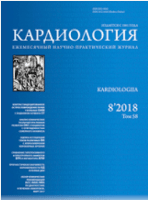
KARDIOLOGIYA
Scope & Guideline
Fostering Collaboration for Heart Health Advancements
Introduction
Aims and Scopes
- Cardiovascular Disease Mechanisms and Pathophysiology:
Research exploring the underlying mechanisms of various cardiovascular conditions, including myocardial infarction, heart failure, and arrhythmias, is a core focus. This includes studies on biomarkers, genetic predispositions, and the effects of comorbidities such as diabetes and hypertension. - Innovative Diagnostic and Therapeutic Techniques:
KARDIOLOGIYA publishes studies on modern diagnostic methods, such as echocardiography, CT angiography, and cardiac MRI, along with evaluations of novel therapeutic approaches including pharmacological treatments and interventional procedures. - Management of Chronic Heart Failure:
Significant attention is given to the management strategies for chronic heart failure, including the latest insights into pharmacotherapy, rehabilitation, and the use of devices like implantable cardioverter-defibrillators (ICDs) and cardiac resynchronization therapy. - Cardio-Oncology:
The intersection of cardiology and oncology is increasingly represented, with research addressing cardiotoxicity from cancer therapies and the management of cardiovascular risks in cancer patients. - Public Health and Cardiovascular Epidemiology:
The journal also emphasizes epidemiological studies that assess risk factors, prevalence rates, and population health outcomes related to cardiovascular disease, particularly in the context of the Russian Federation.
Trending and Emerging
- Telemedicine and Remote Monitoring:
The increasing reliance on telemedicine for cardiovascular care, particularly post-COVID-19, highlights the importance of remote monitoring and digital health technologies in managing chronic cardiovascular diseases. - Heart Failure with Preserved Ejection Fraction (HFpEF):
Research focusing on HFpEF has surged, addressing its complex pathophysiology, diagnosis, and management strategies, reflecting growing recognition of this condition's prevalence and impact. - Cardio-Oncology Research:
The intersection of cardiology and oncology is increasingly represented, with a focus on understanding and mitigating the cardiovascular effects of cancer treatments, emphasizing the need for integrated care models. - The Role of Inflammation in Cardiovascular Disease:
Emerging studies are increasingly focusing on inflammatory processes as key contributors to cardiovascular pathology, integrating findings from immunology into cardiovascular research. - Personalized Medicine in Cardiovascular Care:
There's a growing trend towards personalized approaches in treating cardiovascular diseases, including the use of genetic and biomarker data to tailor therapies to individual patients.
Declining or Waning
- Traditional Risk Factor Studies:
While risk factors such as hypertension and hyperlipidemia remain relevant, there has been a noticeable decrease in studies focusing solely on these traditional risk factors without integrating newer biomarkers or genetic information. - Basic Science Research on Cardiovascular Pathways:
Research that delves into the fundamental biological mechanisms of cardiovascular diseases, such as cellular signaling pathways without clinical application, appears to be waning in favor of studies with direct clinical implications. - Invasive Surgical Techniques:
There is a shift away from traditional surgical methodologies towards less invasive procedures and medical management, leading to fewer publications on invasive surgical techniques and their outcomes.
Similar Journals

Kardiologie
Innovating Heart Health: Where Research Meets Clinical Practice.Kardiologie is an emerging journal dedicated to advancing the field of cardiology and cardiovascular medicine, published by SPRINGER HEIDELBERG in Germany. Established with the first issue in 2022, this journal provides a valuable platform for the dissemination of innovative research, clinical studies, and review articles that contribute to both theoretical knowledge and practical applications in cardiology. While the journal currently holds a Q4 category ranking in the field and occupies a percentile of 24 according to Scopus, it aims to enhance its impact factor by attracting high-quality submissions from researchers and clinicians alike. Kardiologie is particularly focused on bridging the gap between cutting-edge research and clinical practice, ensuring that the latest scientific findings are readily accessible to practitioners. Though it operates under traditional access options at present, the journal aspires to broaden its accessibility and reach in future editions, making it a pertinent choice for anyone interested in the evolving landscape of cardiovascular health.
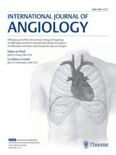
International Journal of Angiology
Empowering the future of cardiovascular medicine with essential findings.Welcome to the International Journal of Angiology, a distinguished publication dedicated to advancing the field of cardiology and cardiovascular medicine. Published by THIEME MEDICAL PUBL INC, this journal plays a crucial role in disseminating innovative research and clinical insights from 1992 through 2024, serving as a vital resource for researchers, healthcare professionals, and students alike. With an ISSN of 1061-1711 and an E-ISSN of 1615-5939, the journal currently holds a respectable Q4 ranking in the cardiology field, reflecting its commitment to quality and relevance. Although it operates under a traditional access model, the journal ensures that critical research findings are shared with a broad audience, fostering collaboration and knowledge exchange. By exploring current trends, diagnostic techniques, and treatment modalities in angiology, the International Journal of Angiology remains an essential platform for those dedicated to improving cardiovascular health around the globe.

Journal fur Kardiologie
Exploring the Heart of Cardiovascular Research.The Journal fur Kardiologie, published by KRAUSE & PACHERNEGG GMBH, is a pivotal resource in the field of Cardiology and Cardiovascular Medicine. With an ISSN of 1024-0098 and an E-ISSN of 1680-936X, this journal has played a significant role in disseminating valuable research and clinical studies from 1998 until its coverage discontinuation in Scopus in 2017. Despite its Scopus rank being relatively low at #316/324 in its category, it continues to serve as a platform for emerging cardiology research. The journal’s scope encompasses various aspects of cardiovascular health, providing insights that are crucial for researchers, professionals, and students alike seeking to advance their knowledge and practice in cardiology. While the journal is not open access, its contributions to the field are essential for those looking to stay informed about the latest developments in cardiovascular medicine.

Minerva Cardiology and Angiology
Pioneering insights in cardiovascular medicine.Minerva Cardiology and Angiology, published by EDIZIONI MINERVA MEDICA, is a prominent journal in the field of cardiology and cardiovascular medicine, with an ISSN of 2724-5683 and E-ISSN of 2724-5772. Established in 2021, this journal aims to foster the dissemination of cutting-edge research, clinical practice guidelines, and innovative methodologies relevant to cardiovascular health. As of 2023, it holds a commendable Q3 quartile rank in its category, reflecting its growing influence within the scientific community. The journal is indexed in Scopus, where it ranks #221 out of 387 in its field, placing it in the 43rd percentile overall. Although it currently does not offer Open Access options, articles published in Minerva Cardiology and Angiology contribute significantly to ongoing discussions and advancements in heart and vascular health. The journal serves as an invaluable resource for researchers, healthcare professionals, and students seeking to stay informed on the latest developments in cardiology.

Arquivos Brasileiros de Cardiologia
Elevating the standards of cardiology research with each publication.Arquivos Brasileiros de Cardiologia is a leading open-access journal dedicated to advancing the field of cardiology and cardiovascular medicine. Established in 1950 and published by the ARQUIVOS BRASILEIROS CARDIOLOGIA, this Brazilian journal plays a crucial role in disseminating high-quality research that addresses both emerging and established topics in cardiovascular science. With an impressive history and a commitment to open access since 1997, it provides researchers, healthcare professionals, and students with free and readily available content that significantly contributes to the understanding and management of cardiovascular diseases. The journal is indexed in Scopus and holds a Q3 ranking in the category of Cardiology and Cardiovascular Medicine, demonstrating its relevance and participation within the global research community. Researchers can submit their work and access a wealth of information that spans a variety of subfields, reflecting the journal’s dedication to fostering innovation and collaboration within cardiology. With a mailing address at Avenida Marechal Câmara, 160-330 Centro, Rio de Janeiro, RJ 20,020-907, Brazil, the journal continues to serve as a vital platform for scholarly communication and knowledge exchange in the cardiovascular realm.
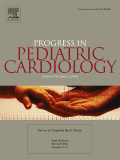
PROGRESS IN PEDIATRIC CARDIOLOGY
Pioneering Discoveries in Heart Health for ChildrenPROGRESS IN PEDIATRIC CARDIOLOGY is a notable journal dedicated to advancing research and knowledge in the fields of pediatric cardiology and cardiovascular health in children. Published by Elsevier Ireland Ltd, this journal serves as a vital resource for clinicians, researchers, and healthcare professionals who engage with the complexities of heart diseases affecting pediatric populations. With ISSN 1058-9813 for print and 1558-1519 for online issues, it operates from Ireland and reflects a commitment to disseminating high-quality, peer-reviewed research since its inception in 1992. The journal is ranked in the Q3 category in both cardiology and pediatrics, indicating its relevance in the academic community, despite recent performance metrics showing room for growth within the competitive landscape. Researchers and practitioners can expect to find cutting-edge findings and clinical studies that aim to improve outcomes in pediatric cardiology. While it does not offer Open Access, the breadth of research covers various critical aspects, contributing significantly to the field's ongoing development.

Nepalese Heart Journal
Empowering Heart Health Through Collaborative ResearchNepalese Heart Journal, published by the CARDIAC SOC NEPAL, serves as a premier platform for disseminating knowledge in the field of cardiology and cardiovascular health. With an ISSN of 2091-2978, this journal aims to bridge the gap between researchers, clinicians, and academicians by presenting high-quality, peer-reviewed articles that address clinical practices, innovative research, and emerging trends in heart disease management, especially within the context of Nepal and the surrounding region. Although it operates under a traditional publishing model, its commitment to excellence aids in reinforcing the scientific discourse in an area critical to public health. The journal is a valuable resource for professionals and students alike who are focused on advancing their understanding of cardiology and its implications for health policy and practice. Exploring the intersections of local challenges and global advancements in heart health, the Nepalese Heart Journal is poised to contribute meaningfully to the evolving landscape of cardiovascular research.
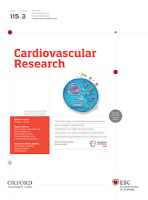
CARDIOVASCULAR RESEARCH
Connecting research to real-world cardiovascular solutions.CARDIOVASCULAR RESEARCH, published by Oxford University Press, is a premier academic journal dedicated to the evolving field of cardiology and cardiovascular medicine. With a remarkable impact factor reflecting its significant contribution to the scientific community, this journal maintains a Q1 ranking in both Cardiology and Physiology categories, demonstrating its commitment to publishing high-quality research that influences clinical practices and healthcare outcomes. Established in 1967, the journal has consistently provided a platform for innovative studies and reviews, aiming to advance our understanding of cardiovascular physiology and pathology. Researchers, professionals, and students will find published articles crucial for their work, as the journal covers a broad spectrum of topics including molecular biology, genetics, and clinical studies. While currently not offering open access options, CARDIOVASCULAR RESEARCH remains accessible through institutional and individual subscriptions, ensuring that the latest findings are available to those in the cardiovascular science community.
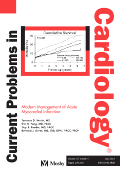
CURRENT PROBLEMS IN CARDIOLOGY
Addressing the Urgent Issues in Cardiology TodayCURRENT PROBLEMS IN CARDIOLOGY is a leading peer-reviewed journal published by MOSBY-ELSEVIER, dedicated to advancing the field of cardiology through comprehensive analyses of contemporary challenges faced by cardiovascular practitioners. With its ISSN 0146-2806 and E-ISSN 1535-6280, this esteemed journal has been a crucial resource for researchers, clinicians, and students alike since its inception in 1976, and continues to publish groundbreaking studies and reviews up until 2024. As a testament to its scholarly impact, CURRENT PROBLEMS IN CARDIOLOGY boasts a prestigious Q1 ranking in both Cardiology and Cardiovascular Medicine, as well as in the broader category of Medicine (miscellaneous) in the 2023 metrics, positioning it among the top journals in its field. With a Scopus ranking of #127 out of 387 in Cardiology, and a 67th percentile ranking, it remains a vital platform for disseminating high-quality research that addresses critical issues in cardiovascular health. Researchers and practitioners looking to stay at the forefront of cardiac medicine will find this journal an indispensable tool for informed decision-making and practice improvement.
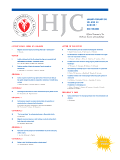
Hellenic Journal of Cardiology
Connecting Researchers and Clinicians for a Stronger Heart FutureThe Hellenic Journal of Cardiology, a peer-reviewed open-access publication under the esteemed ELSEVIER banner, proudly represents the forefront of research in the field of Cardiology and Cardiovascular Medicine. Established in 1993 and actively publishing since then, this journal has carved a niche in disseminating high-quality research and clinical insights relevant to cardiovascular health in Greece and beyond. With an impressive Q2 ranking in both Cardiology and Cardiovascular Medicine categories as of 2023, the journal holds a commendable position at Rank #126/387 in Scopus, indicative of its critical role in advancing scientific knowledge and practice. The Hellenic Journal of Cardiology transitioned to open access in 2016, ensuring that ground-breaking research is freely accessible, fostering a global dialogue among researchers, clinicians, and students alike. Its publication frequency spans significant years, providing a continuous flow of innovative findings while addressing pressing cardiovascular issues. As the journal builds on its legacy, it aspires to enrich the academic community's understanding of cardiovascular medicine, making it an invaluable resource for anyone invested in heart health.